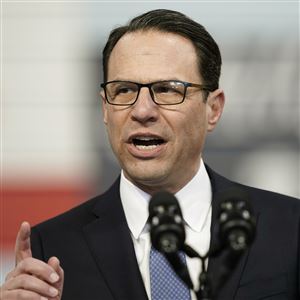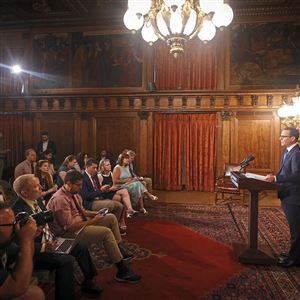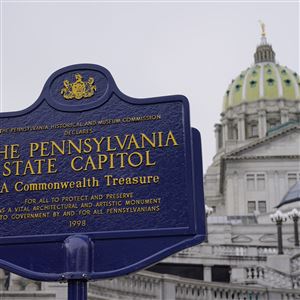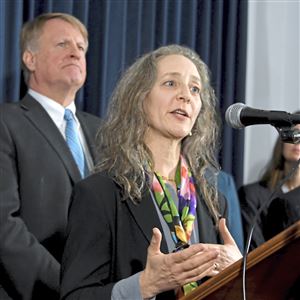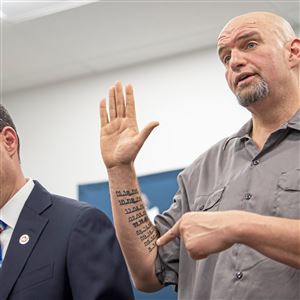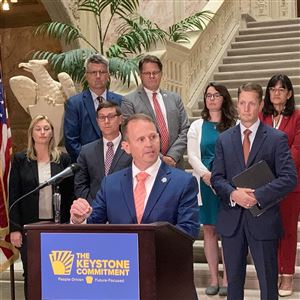HARRISBURG — Pennsylvania will start the new fiscal year Saturday without an approved state budget after partisan divisions and policy disagreements, especially over a proposed school voucher plan, erased any chance for quick House action on a spending proposal the Senate passed Friday.
The lack of a fiscal 2024 budget will likely have little practical effect on state operations unless it stretches into many weeks. Budgets have been late in past years. For instance, then-Gov. Tom Wolf signed the fiscal 2023 budget on July 8 last year.
It was unclear, though, how quickly Republican and Democratic lawmakers will be able to bridge their differences, especially on the Pennsylvania Award for Student Success, or PASS — a scholarship program that many refer to as a school voucher plan. The Republican-controlled Senate passed a bill Thursday night that set up the program.
It then included $100 million in funding for PASS in the $45.55 billion spending bill it approved Friday.
The Friday vote — like the one Thursday night — was 29-21, with Sen. Anthony Williams, D-Philadelphia, joining all Republicans in support. The Senate’s top Republicans said they negotiated closely with Gov. Josh Shapiro, a Democrat who has voiced support for the scholarship concept, on details of the proposed budget.
Sen. Scott Martin, R-Lancaster and chairman of the Appropriations Committee, said Mr. Shapiro’s staff worked “line by line” with Senate Republicans on the proposal.
“I find it ironic it was the Republicans that worked with the governor on his priorities,” said Senate President Pro Tempore Kim Ward, R-Westmoreland.
A number of education-related items in the Senate spending bill are priorities embraced by Mr. Shapiro. The PASS program would give taxpayer-funded scholarships to students in low-performing public schools so they can attend private schools. House Democrats have decried that as funneling taxpayer money to unaccountable private institutions and undermining public education.
A Senate Republican staffer said the chamber’s proposed spending plan — when taking into account various pools of money outside the state’s general fund — is about $300 million less than the proposal made by Mr. Shapiro in March, and lays out different spending amounts than a plan passed by the Democratic-controlled House on June 5.
The Senate package approved Friday included an increase of $567.4 million, or 7.8%, in basic education spending. It also contained funding for student mental health, school safety facilities, the “Level Up” program that steers money to the state’s most financially strapped school districts, and funding for universal free breakfast for all students.
In a statement issued Friday afternoon, a spokesman for Mr. Shapiro, Manuel Bonder, said, “While this bill reflects many of the key priorities the governor has been fighting for — including historic investments in public education, universal free breakfast for public school students, first-time funding for public defenders, and critical funding for public safety, mental health, and economic development – it does not represent a final agreement.”
“A budget can’t make it to the governor’s desk without agreement from both chambers,” Mr. Bonder added, “and there’s still work to be done to solidify a commonsense budget that addresses the most pressing issues facing our Commonwealth. As the governor said yesterday, both sides should remain in our state Capitol and work to compromise in order to reach a full agreement on a budget that delivers for all Pennsylvanians.”
As of Friday evening, the House was scheduled to be back in session Saturday morning.
When word of the Senate-approved spending plan reached the House, both Democratic leader Matt Bradford, D-Montgomery, and Republican leader Bryan Cutler, R-Lancaster, said it would probably take several days to analyze the proposal.
Senators, meanwhile, were leaving town.
Sen. Joe Pittman, R-Indiana and the Republican majority leader, pointed to the fact that Mr. Shapiro and the Democrats who control the House are in the same party.
“We will wait to hear what the governor and his majority party want to do,” Mr. Pittman said. “We will go home and let them figure out where they want to go from here.”
Friday afternoon, the chamber adjourned until September, but it will likely be called back into session far sooner if a budget agreement requires it.
The PASS program appeared to be the single largest stumbling block. After Mr. Bradford learned of the Senate’s approval of it Thursday night, he told reporters there weren’t enough votes in his chamber to pass it.
“If it comes up, it will be defeated,” Mr. Bradford said.
On Friday, Senate Democrats criticized the proposed spending plan that included the scholarship program. Sen. Katie Muth, D-Montgomery, said it failed to adequately fund public education or fully fund human services programs used across the state. Sen. Vincent Hughes, D-Philadelphia, said there were too many details missing.
Lawmakers, Mr. Hughes said, need to come back together and finish the job of negotiating with “all parties at the table.”
Mr. Martin, though, said Republicans had negotiated directly with a Democratic governor, and the result was “a bipartisan budget agreement that strikes at the heart of good government.”
Ford Turner: fturner@post-gazette.com
First Published: June 30, 2023, 7:18 p.m.
Updated: July 1, 2023, 7:11 p.m.








